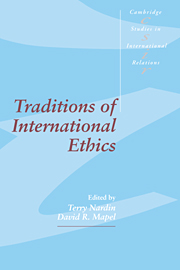Book contents
- Frontmatter
- Contents
- Contributors
- Preface
- 1 ETHICAL TRADITIONS IN INTERNATIONAL AFFAIRS
- 2 THE TRADITION OF INTERNATIONAL LAW
- 3 THE DECLARATORY TRADITION IN MODERN INTERNATIONAL LAW
- 4 CLASSICAL REALISM
- 5 TWENTIETH-CENTURY REALISM
- 6 NATURAL LAW AND INTERNATIONAL ETHICS
- 7 KANT'S GLOBAL RATIONALISM
- 8 UTILITARIANISM AND INTERNATIONAL ETHICS
- 9 THE CONTRACTARIAN TRADITION AND INTERNATIONAL ETHICS
- 10 LIBERALISM AND INTERNATIONAL REFORM
- 11 MARXISM AND INTERNATIONAL ETHICS
- 12 THE IDEA OF RIGHTS IN INTERNATIONAL ETHICS
- 13 BIBLICAL ARGUMENT IN INTERNATIONAL ETHICS
- 14 CONVERGENCE AND DIVERGENCE IN INTERNATIONAL ETHICS
- Index
- Titles in the series
6 - NATURAL LAW AND INTERNATIONAL ETHICS
Published online by Cambridge University Press: 15 September 2009
- Frontmatter
- Contents
- Contributors
- Preface
- 1 ETHICAL TRADITIONS IN INTERNATIONAL AFFAIRS
- 2 THE TRADITION OF INTERNATIONAL LAW
- 3 THE DECLARATORY TRADITION IN MODERN INTERNATIONAL LAW
- 4 CLASSICAL REALISM
- 5 TWENTIETH-CENTURY REALISM
- 6 NATURAL LAW AND INTERNATIONAL ETHICS
- 7 KANT'S GLOBAL RATIONALISM
- 8 UTILITARIANISM AND INTERNATIONAL ETHICS
- 9 THE CONTRACTARIAN TRADITION AND INTERNATIONAL ETHICS
- 10 LIBERALISM AND INTERNATIONAL REFORM
- 11 MARXISM AND INTERNATIONAL ETHICS
- 12 THE IDEA OF RIGHTS IN INTERNATIONAL ETHICS
- 13 BIBLICAL ARGUMENT IN INTERNATIONAL ETHICS
- 14 CONVERGENCE AND DIVERGENCE IN INTERNATIONAL ETHICS
- Index
- Titles in the series
Summary
A tradition of “natural-law” ethics identified
The expression “natural law” is perhaps most commonly used to name a family of views concerning the nature of law, namely, those jurisprudential views united by their common rejection of the position, called legal positivism, according to which law can be identified and understood without reference to moral considerations (Fuller 1964, 95–106; 1968, 112–19; see also “The evolution of international law,” Chapter 2, and “Law, morality, and international affairs,” Chapter 3). Used in this way, “natural law” names a theoretical position or proposition which is accepted by many who have little else in common, and whose various efforts of inquiry do not emerge from or add up to anything like a unified tradition. Agreement on one or more propositions, however important or basic, neither presupposes a common tradition of inquiry nor brings scholars into a unified tradition.
Among those who hold the natural-law position in jurisprudence, however, there is an identifiable group whose work does have features of inquiry within a shared intellectual tradition. Members of this group reject legal positivism because of a common commitment to a set of moral and political views and to a set of analytical strategies that can reasonably be described as belonging to the “natural-law tradition.” This natural-law tradition of inquiry is comprised of the ethical investigations of scholastic moral philosophers and theologians, particularly within Catholicism since the time of Aquinas.
- Type
- Chapter
- Information
- Traditions of International Ethics , pp. 112 - 135Publisher: Cambridge University PressPrint publication year: 1992
- 8
- Cited by

